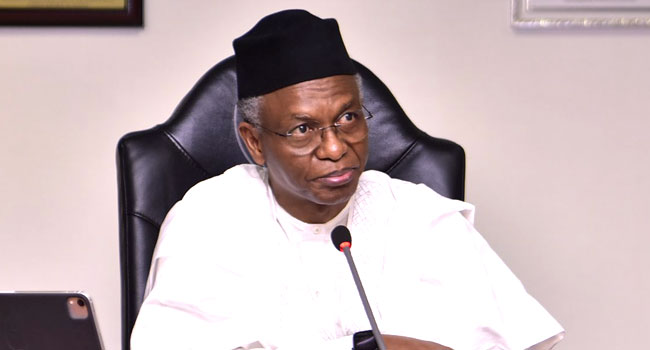El-Rufai wants electricity tariff increased, says FG can’t sustain N1.6trn subsidy
The immediate past Governor of Kaduna State, Nasir El-Rufai, has advocated a hike of electricity tariff even as he said that the Federal Government cannot sustain the over N1.6 trillion subsidy on power revenue shortfalls.
Speaking during the ministerial screening at the Senate, the former governor said the distribution end of the power sector needed to be reconsidered.
Justifying his postulation to the senators, El-Rufai said, “We just need to organize ourselves, remove politics from transmission procurement and focus on improving our transmission infrastructure.
“The third problem is distribution. In 2013, we privatized our distribution companies, 11 of them, 60% to the private sector, 40% to be owned by the government; the idea is that the 40% is supposed to be listed on the foreign exchange so that every Nigerian will be a shareholder in it.”
“10 years after privatization, the government is still subsidizing electricity in one way or the other. As I said, the last time we checked, it was about N1.6trillion in the privatized environment. This is unsustainable and unacceptable,” he said.
El-Rufai, who was a former minister of the Federal Capital Territory, added, “But what do we do with the distribution companies? They have been privatized, about five to six of them are under receivership, and those that bought the companies borrowed from the banks and have not been paying the banks. They (banks) have taken over five or six of them.
“The last time we did a stress test for the distribution companies, only the three out of 11of them are doing well. Therefore, there is a lot of work to be done regarding distribution, because distribution to the last end of electricity does not work, if they don’t collect money, then they will not be able to pay for the power supplied by the generation companies and when they are unable to pay for the gas, it is what the government pays the risk guarantee entered by the Federal Government of Nigeria and have to be addressed, but in a short term, the liquidity in the electricity supply company has to be looked at.”
El-Rufai noted further that tariffs must be cost- effective and even the ownership of these distribution companies would have to change “because right now the banks own about six of them, they control 60% of the shares.”
“Banks are not good as business owners, but they are good at taking whatever they need to recover their loans. So we intend, if given the opportunity, to work out a system in which perhaps we are able to attract fresh capital, new investors with technical and financial capacity into the distribution chains,” he added.
The former governor said it was a problem that required the support of everyone and not only the President who will lead from the front but also the National Assembly.
He maintained that certain amendments in the Electricity Act 2023 might be needed.
“Certain amendments to the PIB 2021 may be needed to bring this sector to alignment so that we provide Nigeria with stable and reliable electricity.
“The President’s vision is that within the next seven years, we will not have the problem of power failure in this country. The President is saddened by the fact that countries like Benin Republic, Niger and Cameroun, our neighbors have reliable electricity, you don’t see power failing in these countries, yet with all our resources and the quality of people we have in this nation we are unable to provide electricity for household and our businesses,” he said.
He urged the National Assembly to be a partner to make this happen, saying, there were many parts of Nigeria that were not covered by the grid.
“The new Electricity Act provides the states with greater involvement now in the Electricity supply industry,” he said.
He also noted that what was happening in the world provided an opportunity for Nigeria to attract a lot of resources into the renewable energy sector utilizing solar, wind and even nuclear and “we are not ruling out using our own reserves to establish power station that will form the base for stability of the power sector, so all options would be looked into.”
“Metering is a big issue, a lot of progress has been made by some of the Distribution Companies in the last three or four years with the support of the CBN and the World Bank, every household should be metered, every business should be metered, estimated billings is not acceptable, but in addition, Nigeria must take a hard stance against those that steal electricity,” he noted.


